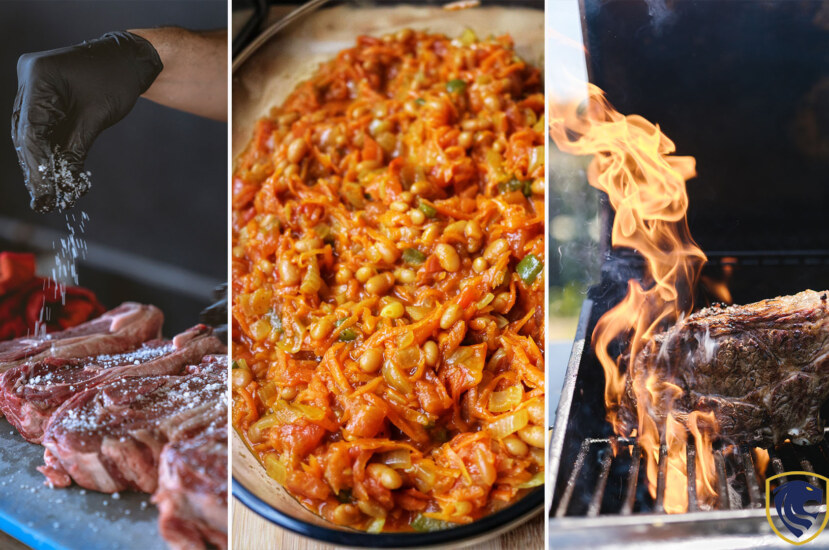South Africa is home to a rich culture and cuisine. South African delicacies contain rich indigenous ingredients that can mesmerize you. Today we are going to present you sort of a guide for the best food that you must try in South Africa
Braai (Barbecue)
There is no other traditional South African food to begin this list other than Braai. In Africa, Braai means grilled BBQ. Moreover, the word braai is used to indicate social gatherings in Africans. The word braai calls for both meanings as there are no social gatherings in south Africa without this traditional meat dish. Usually, African people believe that braais can get friends and family together.
Long ago indigenous African people used wood to put up the flames to make traditional South African Braais. But now they use modern cookers, and BBQ machines to prepare this delicious dish. Normally at African gatherings, people bring their meat for BBQ. In addition, they don’t forget to bring salads and other goodies.

Braai (Barbecue)
Potlucks, another Traditional South African dish, show several similarities to this dish. Traditionally Boerewors (sausage), skewers, lamb, and marinated chicken are used as meat to prepare braais. In coastal areas, fish is used to prepare this delicacy. If you ever got the chance to attend an authentic African gathering do not forget to try this excellent delicacy.
Boerewors
This flavorsome cuisine is a staple in southern African nations like Namibia and Zimbabwe as well. This is a form of sausage as meant by the name. The word Boerewors means “farmers’ sausages”. Traditional Boerewors are made using minced beef. It is combined with local spices including coriander, nutmeg, cloves, allspice, and black pepper to enhance the taste. Now you can find Boerewors made from minced lamb or pork.

Boerewors
Boerewors contain lots of flavors as it is cooked using 90% meat and 10% spices. Traditional South African Boerewors are shaped in spirals. But nowadays you can find different shapes as well. It is usually paired with a corn meal.
Potjiekos
The literal translation of potjiekos is “food prepared in a pot.” The cooking method of this south African dish is also known as a Dutch oven. It is responsible for the dish’s taste. Further, this typical procedure involves layering fresh veggies and topping them with sauce. Also, it should be cooked on low heat, generally over a small fire outside. The majority of indigenous South Africans were taught the technique of controlling fire heat from an early age.

Potjiekos
To preserve the pot’s contents’ heat and moisture, skilled cooks try to avoid removing the covering lid to check the meal as little as possible. The number of layers and chunky meat, which is often at the bottom, affect the cooking time. When the food is done, it is served with one scoop from the bottom mix rather than being mixed. Meat with sinewy pieces transforms into jelly, becoming supple and delicious.
The Afrikaans term “Malva” refers to a rose-scented or the fragrance of a lemon geranium plant. This traditional African dish does reflect the idea of the same. It is a straightforward sponge cake. Moreover, its first flavoring came from lemon leaves.

Malva Pudding
The cake may have been named after a woman named Malva or a specific liqueur called Malvasia. Malva is a highly appreciated delicacy in Africa. Also, this cake s typically served hot in the Southern areas. Also, locals pair it with jam or custard.
According to Art Smith, who served as Oprah Winfrey’s chef, the dessert is so delightful that it is now well-known on the US West Coast.
Chakalaka
Chakalaka is a typically spicy pickle made from a variety of vegetables. This dish includes peppers, tomatoes, onions, and carrots. It is frequently offered at braais to go with side dishes like pap, which is similar to polenta but smoother, and pairs excellently with boerewors.

Chakalaka
Bobotie
This dish has been Originated in Malaysia. It is a meatloaf that is typically served with yellow rice, banana slices, and chutney. Also, it has raisins and a fried egg on top. According to the Afrikaans dictionary, the term “bobotie” is derived from the Malay word “boemboe,” which indicates curry spices. Nevertheless, other people believe that it is derived from the word “bobotok,” which refers to an Indonesian meal with a variety of indigenous ingredients.

Bobotie
Usually, this south African cuisine is consumed as a dinnertime delicacy. Also, it contains curry, turmeric, and almonds. Locals eat bobotie, which has a sweet flavor, with the renowned spicy sauce.
Vetkoek
This traditional South African meal is like an African version of Fried Donuts which are Stuffed with Minced Meat.
Vetkoek is among the healthiest and most straightforward meals from South Africa. The options for fillings that are used to stuff Vetkoek are limitless. They are frequently stuffed with cold meats, boerewors, or ground beef in South Africa.

Vetkoek
Also, locals serve them in braais very frequently. The Dutch oliebol has a big effect on Vetkoek. Further, it is a famous dish in most of South Africa’s poorest communities and neighborhoods. This is primarily due to how easily they can be prepared and how satisfying they are. Also, they are sold by truckload at fast food restaurants and street sellers.
Monkey Gland Sauce
This weirdly named sauce has long been a mainstay on the menus of South African restaurants. This Sause contains a sweet and tangy flavor. Also, it is frequently used as a topping for grilled steaks and hamburgers. Although there are many different recipes for it, normally it’s created with tomato sauce, chutney, onions, garlic, vinegar, soy sauce, ketchup, mustard, and Worcestershire sauce.
I know, now you may wonder what part of the monkey is used to prepare this Sause. But the truth is this Sause has nothing to do with monkeys. The origin of its name is the subject of several hypotheses.

Monkey Gland Sauce
The claim a French scientist who was researching to treat male infertility inspired the sauce’s name is the most widely accepted. To revive the energy of impotent men, he would transplant monkey testicle tissue into human testicles.
Dr. Voronoff was a frequent customer at the Savoy Hotel in London, where he frequently ordered a brandied steak. So, there the waiters affectionately referred to them as having “monkey gland sauce” in honor of his research. Later, when one of the hotel staff members relocated to South Africa, he took the meal with him.
Regardless of where it came from, South Africa now uses monkey gland sauce often.
Rusk
We must go back to the late 1690s to find the dish’s origins. At that time, South Africans desired to develop a breakfast cake that they could store for an extended period of time.
They frequently pack this meal as dry food for lengthy trips so that it may keep its crunch. Because it also contains buttermilk and raisins, you may draw a comparison between this delicacy and the classic Indian biscotti.

Rusk
This traditional south African rusk is also backed twice, just like Indian biscotti. Moreover, it is frequently soaked in coffee. But, the flavor will be unique, so give it a shot.
Nowadays, South Africans consume this dish in all three meals and as a snack.




